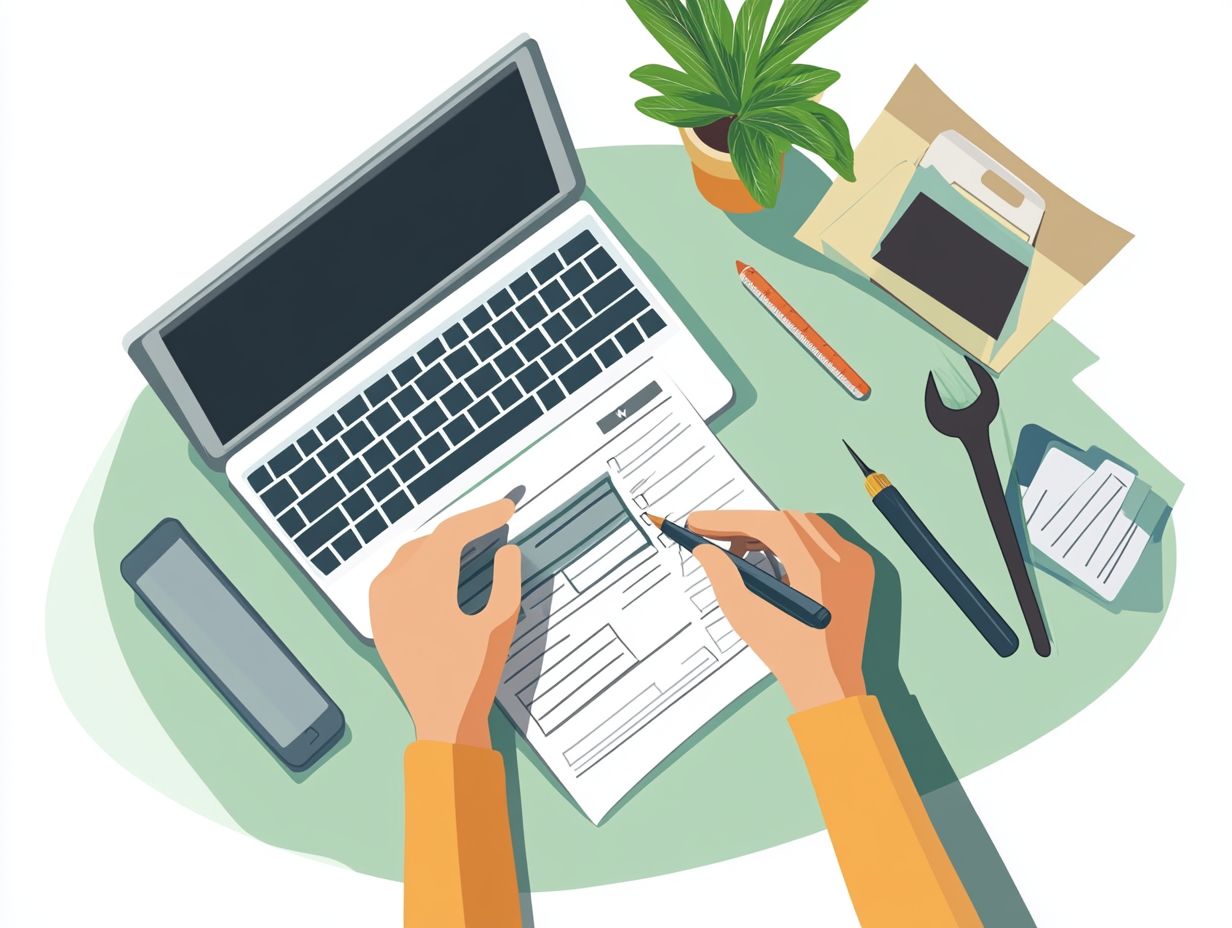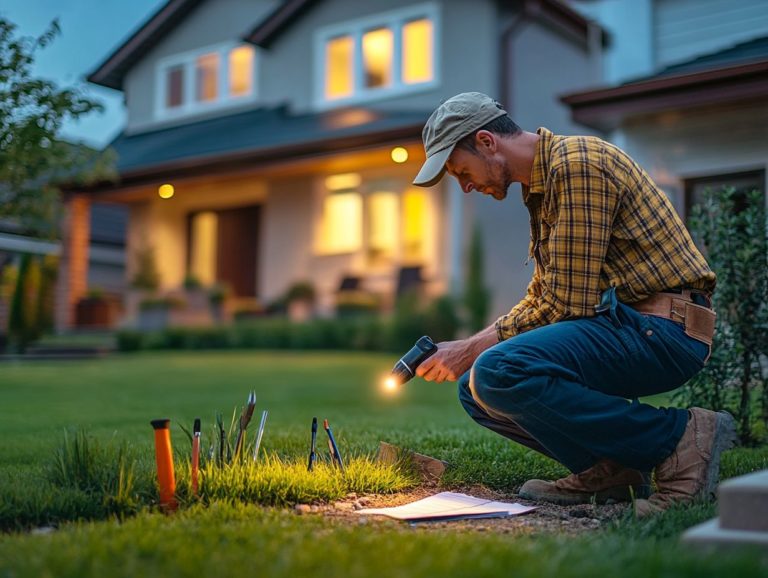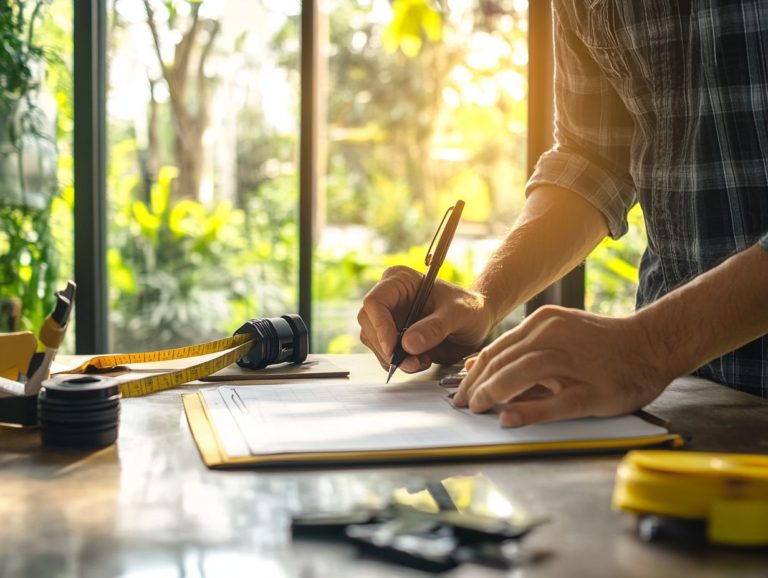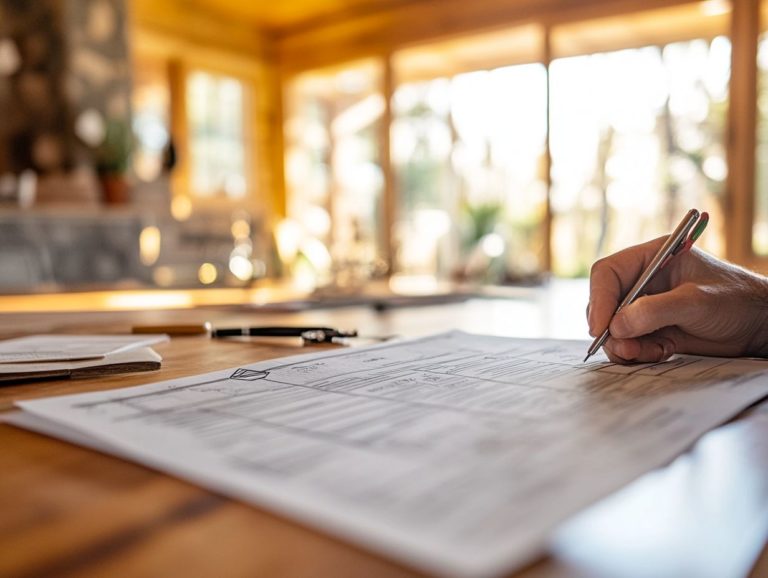How to Select a Home Inspector for Your Needs
Buying a home is one of the most significant investments you will make.
A thorough home inspection ensures you are making a sound decision.
This article delves into the importance of home inspections, guiding you through the key qualities to seek in a home inspector, crucial questions to pose, and effective strategies for locating a trustworthy professional.
We also provide tips on how to prepare for the inspection.
By the end of this article, you’ll feel confident and ready to tackle the inspection process!
Contents
- Key Takeaways:
- Importance of Home Inspections
- Qualities to Look for in a Home Inspector
- Questions to Ask a Home Inspector
- How to Find a Reliable Home Inspector
- Preparing for the Home Inspection
- Frequently Asked Questions
- What should I look for when selecting a home inspector?
- How do I verify the credentials of a home inspector?
- Should I choose a home inspector recommended by my real estate agent?
- What questions should I ask a home inspector before hiring them?
- How much does a home inspection usually cost?
- Can I attend the home inspection?
Key Takeaways:
- Choose an experienced home inspector with credentials.
- Research and ask for referrals to find a reliable inspector.
- Check for certifications and insurance for your peace of mind.
- Prepare for the inspection to know what to expect.
Importance of Home Inspections
Home inspections are a must-have in the home-buying journey!
They help uncover potential issues before you make a purchase.
For you as a buyer, a thorough inspection can disclose hidden problems like structural concerns, pest infestations, and various safety risks that could jeopardize the property’s value.
Grasping the significance of an inspection report is essential for both you and your real estate agent.
This enhances communication and informs negotiation strategies throughout the process of securing your new home.
Why You Need a Home Inspection
A home inspection is an essential step for any home buyer.
It reveals potential issues that could jeopardize both the safety and the value of a property.
By enlisting a trusted inspector, you can uncover critical structural concerns, such as foundation problems, roofing defects, and plumbing issues that may not be immediately apparent.
These hidden dilemmas can lead to expensive repairs later on, significantly impacting your budget and peace of mind.
By understanding the condition of major systems and components before making a purchase, you enable yourself to make informed decisions.
This knowledge can enable you to negotiate repairs or price adjustments and ultimately save on future home maintenance costs.
Such diligence not only ensures a sound investment but also contributes to a safer living environment.
Qualities to Look for in a Home Inspector
When you’re hiring a home inspector, seek specific qualities that will help you understand how to spot a good home inspector and guarantee a thorough and dependable evaluation of the property.
Experience and Credentials
Your choice should heavily weigh on their experience and credentials as these factors directly influence the quality of the inspection services you ll receive.
A seasoned professional brings a wealth of knowledge that can make all the difference.
They understand the nuances that newcomers might overlook, ensuring that every nook and cranny of the property is scrutinized with precision from the foundation to the rooftop.
Certified qualifications are essential; they reflect an inspector s dedication to industry standards and ongoing education.
With a certified inspector, you can rest easy knowing they ve undergone rigorous training and uphold ethical practices.
By enlisting a highly qualified home inspector, you re not just uncovering potential issues; you re also securing peace of mind throughout the home buying process.
Communication and Availability

Effective communication and availability are essential traits in a home inspector, ensuring you receive a clear and comprehensive inspection report.
A reliable inspector prioritizes open lines of communication, not just to explain findings but to foster a sense of trust between you and them.
By encouraging you to ask questions during and after the inspection, they can address any concerns right away an invaluable asset during the often stressful home-buying journey.
Detailed reporting is equally vital; it becomes your go-to reference, helping you make informed decisions.
This blend of open dialogue and thorough documentation ultimately enables you to manage your potential investment with confidence.
Don’t take chances with your investment. Ensure you choose the right home inspector to protect your future!
Questions to Ask a Home Inspector
Asking the right questions can profoundly elevate your understanding of the home inspection process and the inspector’s findings. It s crucial for home buyers like you to come prepared, ensuring you grasp every detail and nuance in the evaluation.
Clarifying the Inspection Process
Clarifying the inspection process with your home inspector can significantly enhance your understanding of what to expect during a thorough inspection. This ultimately results in a straightforward inspection report.
Throughout the inspection, various areas will be carefully checked, including the foundation, roofing, plumbing, and electrical systems. Your home inspector may utilize advanced technology, such as thermal imaging, moisture meters, and drones, to gain a more comprehensive view of potential issues.
Each of these areas is essential. For instance, the integrity of the foundation ensures the overall stability of your home. Meanwhile, the condition of the roof directly impacts energy efficiency and weather resistance.
As the inspector examines these components, they compile detailed findings that result in a straightforward inspection report. This report outlines necessary repairs, highlights potential hazards, and provides recommendations for future maintenance.
Understanding the Inspector’s Findings
Understanding the findings of your home inspector is crucial. It reveals potential issues that could impact your home s safety and highlight necessary repairs. This detailed report provides a comprehensive overview of the property’s condition, drawing attention to areas that may need immediate action think electrical systems, plumbing leaks, or structural integrity.
You should carefully analyze the key findings, particularly those related to safety hazards like faulty wiring or mold. Ignoring these issues could lead to serious health risks or costly renovations down the line.
The recommendations from the inspector help you prioritize repairs. They also guide negotiations with sellers about necessary remedies. By addressing the concerns outlined in the report, you can ensure your new home becomes a safer, more secure environment, enhancing your peace of mind in this crucial investment.
How to Find a Reliable Home Inspector
Finding a reliable home inspector is vital. Don’t leave this to chance; take the time to do your research. Ask for referrals from trusted sources and verify their credentials. This diligence will ensure you receive a quality inspection service that meets your needs.
Researching and Referrals

Researching local inspectors and seeking referrals from trusted sources is an essential step in your journey to find a reliable home inspector. This process involves reaching out to friends, family, and colleagues who have recently bought or sold homes to gather their recommendations based on personal experiences.
Utilizing online resources like the Better Business Bureau can also provide invaluable insights into the performance and credibility of potential inspectors. Dive into customer reviews to uncover real experiences; they spotlight positive interactions and reveal areas of concern, enabling you to make a fully informed decision.
Investigate an inspector s qualifications, certifications, and areas of expertise. This is vital in ensuring a thorough home inspection.
Checking for Certifications and Insurance
Verifying certifications and insurance is essential for ensuring that you hire a certified home inspector who meets industry standards. This crucial step not only confirms that the inspector possesses the necessary knowledge and skills but also provides you with peace of mind regarding their professional integrity.
A qualified inspector typically holds certifications from recognized industry organizations, reflecting their completion of rigorous training and adherence to ethical codes. Ensuring they have appropriate insurance coverage protects you from potential liability in the event of accidental damage or oversight during the inspection process.
By prioritizing these credentials, you can confidently select professionals who genuinely understand the intricacies of property assessments, ultimately safeguarding your investment.
Preparing for the Home Inspection
Preparing for a home inspection means familiarizing yourself with the essential steps to ensure your property is primed for a comprehensive evaluation by the inspector.
Steps to Take Before the Inspection
Taking specific steps before the home inspection can set the stage for a seamless evaluation process, ensuring your property is ready for the inspector’s visit. As a home buyer, consider a few key preparations to improve the inspection experience.
- Make sure all utilities water, electricity, and gas are turned on. This allows the inspector to thoroughly assess the systems within your home.
- Provide unobstructed access to critical areas like the attic and basement. These spaces often house vital components, such as the HVAC system, insulation, and electrical wiring, which can significantly impact the inspection report.
By following these straightforward steps, you can help guarantee that your property reveals no hidden red flags, leading to a more informed and confident transaction.
What to Expect During the Inspection
Get ready! Knowing what to expect during the home inspection can ease your anxiety as you navigate this crucial process.
During the inspection, the inspector will carefully check different parts of the home to ensure safety and compliance with established standards. This thorough evaluation typically takes two to four hours.
This comprehensive inspection includes assessing the foundation, roof, plumbing, electrical systems, and HVAC units. The inspector will pay special attention to potential safety hazards such as mold, structural issues, and outdated wiring.
The inspector will provide valuable insights into the home s overall condition, spotlighting areas needing immediate attention or ongoing maintenance.
Familiarizing yourself with these key elements boosts your confidence as you consider your new home, allowing you to make informed decisions that benefit your future.
Frequently Asked Questions

What should I look for when selecting a home inspector?
- Look for a licensed and certified inspector.
- Check their experience and customer reviews.
- Consider their areas of expertise to ensure they fit your needs.
How do I verify the credentials of a home inspector?
- Check their license and certification with your state’s regulatory board.
- Ask for references and read reviews from previous clients.
Should I choose a home inspector recommended by my real estate agent?
While it may seem convenient to use a home inspector recommended by your real estate agent, it s best to conduct your own research. This ensures the home inspector is unbiased and has your best interests in mind.
What questions should I ask a home inspector before hiring them?
- Ask about their experience and areas of expertise.
- Inquire about what is included in their inspection services.
- Ask if they have any sample reports or offer guarantees for their work.
How much does a home inspection usually cost?
The cost of a home inspection can vary based on the size and location of the property, as well as the inspector’s experience and services offered. On average, a home inspection costs between $300 to $500.
Can I attend the home inspection?
Yes! Most home inspectors allow clients to attend the inspection. This gives you the opportunity to ask questions and learn more about the property’s condition. If you can’t attend, most inspectors will provide a detailed report with photos and explanations of their findings.
If you have any questions or concerns about the home inspection process, feel free to reach out! We’re here to help.






